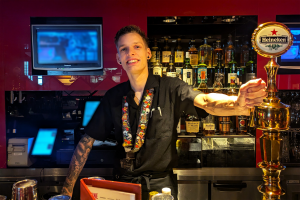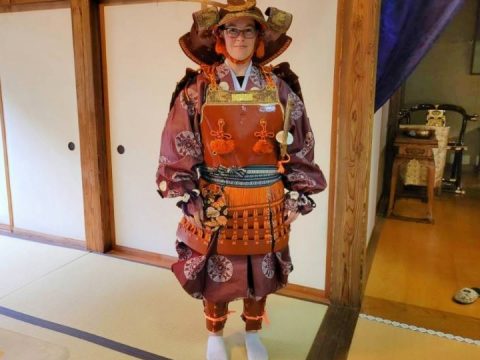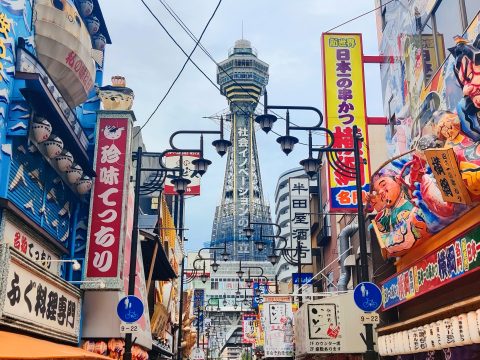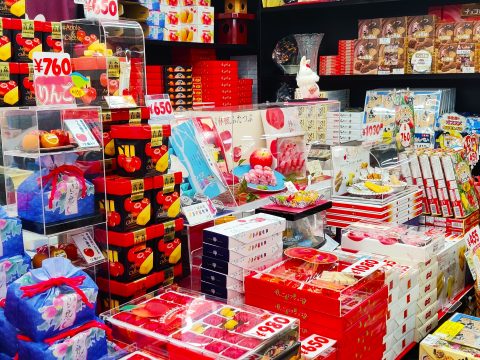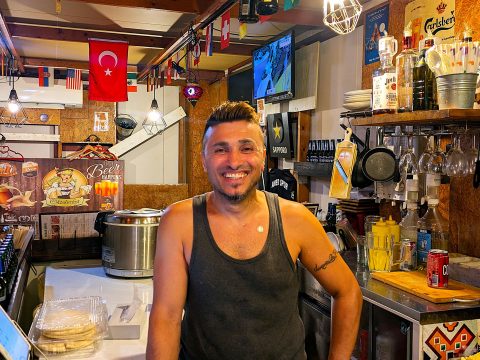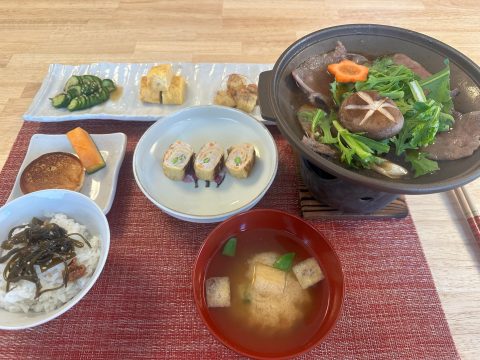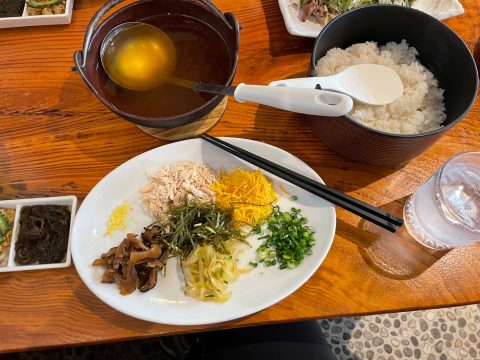Interview: Why this Dutch bartender loves working in a team.
WORK’IN JAPAN
12.11.2025
What is it like to work in Japan? I started interviewing people who work in restaurants, bars, or cafes to learn from their personal experiences. The fourth person in this series will be Jelle, who is also from the Netherlands.
He came to Japan for the first time, half a year ago, and landed a job as a bartender at a rock-themed franchise restaurant in Roppongi, Tokyo.
Why did you come to Japan, and how did you end up at your current job?
“I wanted to learn Japanese, and I figured there is no better place for that than in Japan. Also, my girlfriend is half Japanese, so this seemed like a great adventure for us both. I came here on a working holiday visa, and I simply started looking on recruiting websites and stumbled upon this job ad for a bartender.
I already knew the restaurant as it is quite well known around the world, so I was very motivated to just apply and hope for the best. Although the job required staff to be conversational in Japanese, I had only just started learning the language from zero. Still, I was invited for an interview shortly after arriving in Japan — and got hired!”

What do you like about Japan?
“Everything. When I first came here, I was shocked by how structured everything is. The trains, for example. They run on time, they’re clean, everyone waits in line, everyone lets other people get off the train first, and everyone is quiet.
I had to get used to the culture because it’s different, but not because it’s annoying or less comfortable. People are generally friendly, patient, and helpful. And the food is amazing. Everything I try here is delicious, and I love that so many places are open until late or even 24/7. My favorite food so far is shabu shabu. And I also love ramen, especially after a long day at work.”
How has your previous work experience prepared you for working in Japan?
“In the Netherlands, I’ve worked at restaurants since I was 16 years old, and I regularly worked as an electrician and construction worker on the side.
Having worked at companies ranging from a holiday park to a farm-style steak house and pancake restaurant, I started at the bottom and eventually became a manager. Because of this, I was confident that I could do my current job well.
But at the same time, I was unsure of what to expect regarding the work culture here in Japan. I expected to work long hours in a very hierarchical work environment. Of course, I expected that the service industry would be very different from corporate jobs, which also tend to attract a different type of people.
And indeed, when I started working here, I was very relieved and received a warm welcome from all the other employees. I’m lucky to work in a very diverse and cheerful team.”

What are some differences between working in a restaurant here and in your own country?
“Something that really surprised me is that people say ‘thank you’ all the time.
For example, every time I simply finish making a drink and put it on the counter, my coworker will thank me before bringing it to the customer. Because I make hundreds of drinks per day, to say ‘thank you’ every time seemed so unnecessary, especially because I’m simply doing my job.
But it made me realize that it creates a good work atmosphere. I also get thanked when I work on my day off, if someone calls in sick, for example. I was always used to being put to work as soon as I show up, because usually it’s quite chaotic with one staff member less.
Here, everyone on the team first takes a short moment to thank me for working on my day off and to show their appreciation.”

So your coworkers are a big reason why you like your job so much?
“Exactly, it’s the small things that make me feel appreciated. And they also reward me whenever I do something ‘extra’.
For example, I recently fixed a broken bar shutter. The manager was hesitant to get it fixed by a costly handyman, and for some time already, he had been trying to decide what would be the best solution.

I simply asked for an electric screwdriver and quickly fixed it myself. Everyone was very surprised by my hands-on mentality, and they gave me a coupon for a free burger set. It made me realize that within this company, everyone has their own tasks and nobody expects you to do anything that’s not in your job description.
At my previous jobs, it seemed like people didn’t care much about everyone’s position, but everyone was simply expected to do whatever needed to be done.
Therefore, I never received this type of appreciation or gratefulness, because most people I know would just take it for granted. I don’t expect or need a reward every time I do something extra, but it certainly makes me feel appreciated and part of a caring team.”
How long will you stay in Japan?
“After my one-year working holiday visa runs out, I will return to the Netherlands. I really love Japan, but this really feels like a break for me, because eventually I want to return. The longer I stay here, the more it feels like I’m procrastinating and putting off adulting, because I’m having such a good time here. After this year, it’s time for me to get back to reality, and I already have a few plans lined up.”
What will you do after you return to your country?
“I’ll probably start different part-time jobs. I’d like to work for a friend who is soon going to start his own company for clearing properties. I also know someone who is going to start building houses, and because I have experience in construction, I will help him with that.
I also want to work as an electrician again, at my old job. Finally, I will probably tell my previous workplace, the farm-style restaurant, that I want to work whenever they are in need of extra staff. All these people are amazing friends who feel like family, and for me, that’s priceless. Then it doesn’t matter what kind of work I do, because I know I’ll have a great day when I’m surrounded by people like them.”
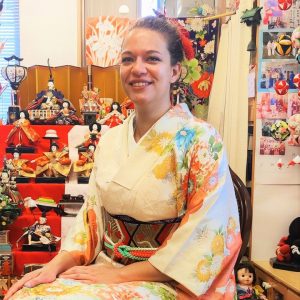
Mietta Varszegi
Mietta grew up in the Netherlands and moved to Japan in 2019 to work as an English teacher. Now, she has 3 different jobs, explores Tokyo on days off and takes trips around Japan whenever she can. But everywhere in Japan, the goal is the same: visit as many shrines, castles and parks as possible and eat everything!
Read previous articles by the writer
Read latest articles
KEYWORDS
- # PICKPICK
- # Resume
- # alcohol
- # Rice
- # Soup
- # winter food
- # Fast Food
- # seafood
- # spicy foods
- # raw food
- # fermented food
- # Transportation
- # MEAT
- # Edo culture
- # suits
- # clothing
- # drink
- # fish
- # seasoning
- # Japanese New Years Foods
- # Toshikoshi soba
- # Osechi Ryori
- # Ozoni
- # Christmas
- # Japanese fusion pasta
- # Wafu Pasta
- # Japanese Hot Pot
- # なべ
- # 鍋
- # Miyazaki
- # Chicken Nanban
- # Karamen
- # Autumn Wagashi
- # Mushi-yokan
- # Imo-yokan
- # Japanese Autumn Fruits
- # Autumn
- # Vending Machine
- # fall
- # dango
- # Chestnut rice
- # saury
- # Mushroom
- # Rice vinegar
- # Japanese condiments
- # 調味料
- # Sake
- # Mirin
- # Soy sauce
- # Japanese Noodles
- # Udon
- # Ramen
- # Yakisoba
- # Soba
- # Japanese Seaweed
- # 海藻
- # かいそう
- # Payslip
- # Training
- # Japanese summer foods
- # 和菓子
- # Wagashi
- # ryokucha
- # 夏
- # 飲み物
- # Ramune
- # ラムネ
- # Pokari Sweat
- # ポカリスエット
- # Calpis
- # カルピス
- # Mugicha
- # ume
- # 梅
- # うめ
- # umeshu
- # job hunting
- # tofu
- # Recruitment in Japan
- # miso
- # Japanese cuisine
- # Yellowtail and bonito
- # Children’s Day
- # Kashiwa Mochi
- # Chimaki
- # fruits
- # Kusamochi
- # Types of Agriculture in Japan
- # bread
- # パン
- # パン屋さん
- # japanese bread
- # shokupan
- # meal blead
- # anko bread
- # 桜
- # さくら
- # cherry blossom
- # visa
- # hanami
- # omotenashi
- # sakura
- # おもてなし
- # Japanese hospitality
- # oshibori
- # wet hand towel
- # hand towel
- # restaurant
- # Commuting in Japan
- # Women-only cars
- # Exit gate
- # japanese train
- # train
- # valentine
- # Japanese sweets
- # 朝食
- # Japanese Breakfast
- # Breakfast
- # Japanese
- # 日本
- # healthy
- # persimmons
- # hoshigaki
- # HR
- # work in Japan
- # jinji ido
- # corporate systems
- # Japanese work culture
- # bento
- # ekiben
- # shinkansen
- # omiyage
- # train station
- # Japanese culture
- # work culture
- # mentaiko
- # umeboshi
- # Japanese snacks
- # potato chips
- # Japanese potato chips
- # Japanese writing
- # seaweed
- # konbu
- # ocean foods
- # shio konbu
- # dashi
- # miso soup
- # food processing
- # pear
- # nashi
- # sweet potato
- # japanese sweet potato
- # stingray
- # satsuma imo
- # food value chain
- # homecooking
- # agriculture
- # Japanese homecooking
- # farming
- # nikujaga
- # shojin ryori
- # meat and potatoes
- # traditional foods
- # comfort food
- # buddhist food
- # manufacturing
- # factory
- # eihire
- # vegetarian
- # food and beverage
- # izakaya
- # yatai
- # japanese festival
- # taiyaki
- # matsuri
- # summer
- # Ikayaki
- # smart agriculture
- # shaved ice
- # kakigori
- # かき氷
- # summer dessert
- # Japan
- # Japanese foods
- # dessert
- # fruit
- # matcha
- # icecream
- # Pikcup
- # Pikc up
- # Pcikup
- # skilled labor visa
- # working visa japan
- # Dineer Table in Japan
- # Japanese manner
- # Japanese food
- # Japanese Table Manner
- # Chopsticks
- # Japanese traffic signs
- # traffic information
- # road rules in Japan
- # chocolate
- # green tea
- # Osaka
- # Work Japan
- # Japanese company
- # ikura
- # sushi
- # nigiri
- # wasabi
- # PCIK
- # PICK UP
- # PICK
- # PICKUP

